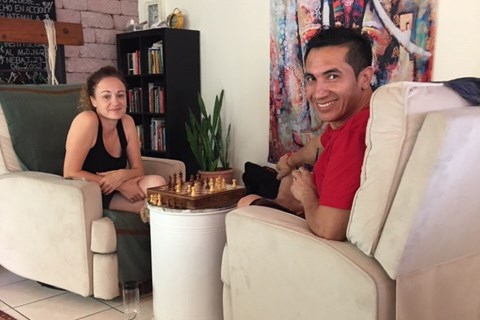An Elmvale mom is waiting anxiously to hear what she hopes will be news that her son-in-law is acquitted of charges brought against him because of his human rights activism in Honduras.
Honduran-born Edwin Espinal, husband of Elmvale native Karen Spring, was arrested and imprisoned on Jan. 19, 2018 following nationwide anti-government protests in Honduras. He was accused of making and using homemade explosive devices during the protests.
Espinal was released from prison on Aug. 9, 2019, with a trial pending.
His trial, which has been combined with the trial of another human rights defender Raul Alvarez who faces similar charges, started today (Sept. 13) and will continue Sept. 14.
In Elmvale, Espinal’s mother-in-law, Janet Spring, is worried and frustrated she isn’t in Tegucigalpa with her daughter and son-in-law.
“Edwin and Raul must rely on a judicial system that is often not sound,” said Spring. “My heart is there … I should be there, I wish I were there.”
Spring is a professor at Lakehead University. She decided travel was unwise given the COVID risk and her work in the public sector.
“They’re dealing with a [judicial] system that doesn’t work for the people at all,” said Spring. “It’s been a very difficult uphill battle. The uncertainty around the whole process has just been agonizing.”
Espinal was charged with arson, and accused of being in an organized crime group. The charges followed years of Espinal’s work as a human rights defender in Honduras.
Janet Spring said the charges are trumped-up. They have not been proven in court. One of the charges against Alvarez was dismissed during today’s proceedings.
Espinal and Alvarez met in prison, but are accused of being part of the same crime group. They were both put in solitary confinement for weeks at the beginning of their imprisonment.
Amnesty International condemned the conditions of the imprisonment where there was little to no water – and it was not safe for drinking – widespread tuberculosis outbreaks, inedible and insufficient food sometimes crawling with bugs, and a lack of basic sanitation. Espinal had to wait months to see a doctor and get antibiotics for an ear infection. He lost part of his hearing as a result.
An Amnesty report stated the use of force and arbitrary detentions for people like Alvarez and Espinal is a tactic being used to suppress dissent in Honduras.
Spring said if Espinal and Alvarez are convicted of the trumped-up charges against them, they could go back to prison for 15 to 25 years.
“They would not survive,” said Spring.
Espinal and Alvarez released a public statement via YouTube ahead of their trial.
In the video, Espinal said he felt like the “living dead” while imprisoned.
“We face trial for protesting and for demanding the rights of the Honduran population,” said Espinal.
Thousands of Hondurans took part in anti-government protests over several months following the 2017 election, which was rife with irregularities. Many protesters were injured and some killed when military forces opened fire on the protesting crowds.
A human rights group called Committee for the Families of the Detained and Disappeared in Honduras, stated at least 21 people were killed by the military police during protests. Many more were arrested, charged with violent crimes, and accused of being part of criminal gangs.
Alvarez said he is worried about going back to a maximum-security prison.
“We are scared for ourselves, but even more scared that the goals and dreams of the Honduran people are not achieved,” he said. “Whether we are found guilty or acquitted, we are committed to continuing to struggle for what we hope for, to see the Honduran people free from so much corruption, impunity, dispossession and exploitation.”
In Simcoe County, a growing group of people have been standing in solidarity with Espinal, Alvarez and scores of political prisoners in Honduras.
The Simcoe County Honduras Rights Monitor has been raising funds and awareness to support the defence team and advocacy work in Honduras.
Funds raised by the group have gone to support feeding programs in Honduras that have carried on providing groceries and meals to Honduran families throughout the pandemic.
Prior to the COVID pandemic, the group helped sponsor a Canadian delegation to Honduras in addition to advocating on the political prisoners’ behalf to Canadian and International government officials.
“I think it’s really important for people to understand that we have got so much support from Canadians … it’s the support of our rural community of Elmvale that’s really given us the drive and the spirit to keep going,” said Spring. “I hope for the very best for Edwin and Raul so they can go on with their lives.”
The Spring family is looking forward to the day when Edwin can become a permanent resident of Canada with his wife Karen.
Amnesty International Canada has created a digital action, which is like a petition with an added element that signatories send emails to the office of the Attorney General asking for Canada’s government to put pressure on the Honduran government for a fair trial in line with international standards, and a transparent court proceeding that is public. You can find the online action here.
